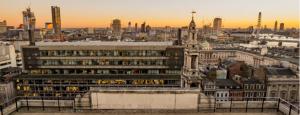
The Campus
King’s Strand campus is right next to the Thames and a short walk away from Covent Garden, the West-End musicals and multiple tube stations. The strand campus is beautiful, especially the grand staircases with statues of Sappho, Sophocles and Reggie (the King’s mascot). It includes the chapel, a beautiful room where you can frequently hear tantalising music coming from, Chapters, (a café), and the River Terrace, with a view right to the Thames. Across the road from the Strand campus is Bush House, my personal favourite location for seminars and lectures. Beautifully decorated on the outside, it is incredibly modern on the inside and includes the student union, (KCLSU) the Shack, (a café), The Vault, (a student bar), and the King’s Kitchen, where you can enjoy freshly prepared hot meals. Bush House also hosts a vegan café, as well as one of the most amazing views of central London on the eighth-floor terrace. Because it is a relatively small course, seminars tend to be groups of 10-25 people, making group discussions less intimidating to join in on. In summary: the Strand campus is great and makes those long days of studying easier to bear. It is also a 10-minute walk to both the Maughan Library and the British Museum.

The King’s Classics Society
People from any subject can join the Classics society, and I would recommend it as they are known for putting on some of the best events at King’s. So far in my first year some of the events they have hosted have been a black-tie Symposium in the Great Hall, a Winter Ball at Blame Gloria in Covent Garden, a pizza party in the Classics common room, (another bonus of studying Classics- not many subjects have their own common room,) and a boardgames and cookie decorating night. The society members are all incredibly friendly and approachable for help with an essay, advice for homework or for a rant.
Range of future job options
Classics is quite an open-ended degree, meaning you will have multiple opportunities on what to do after university. I’ll provide some examples of famous Classicists to express how varied your career options can be:
- Boris Johnson, conservative Prime Minister.
- J.K Rowling, author of Harry Potter.
- Tom Hiddleston, actor.
- Thomas Jefferson, 3rd President of the USA.
- Jane Addams, American activist of world peace.
Other popular career options include: working as a diplomat in the Foreign Office, going into education, journalism and working in or with museums.
Learning a language, (if you want to- it isn’t obligatory!)
One of my favourite modules is Greek Language, where I learn to translate, write, read and pronounce ancient Greek. It provides a deeper understanding in other modules and although it is difficult, it is very rewarding. No matter what language skill you have the hands-on teaching in very small language groups leads to an easier learning experience. You can also choose to learn Latin, and you can start learning at a beginner, intermediate or advanced level, to suit all levels of prior knowledge. Also, the freedom to choose all of your modules at King’s, as no Classical modules are compulsory, allows you to really focus on what you are interested in.
How Classics relates to modern day
Across all modules, it is always interesting to see how Classics is relevant in modern day society. Especially at King’s, with easy access to the British Museum, where you can see objects you learn about, and even the architecture and statues of London is a daily reminder that Classics is not a dead subject. Newly developed arguments about the roles of women, slaves and other marginalised groups in ancient history (and modern day) have unveiled a new layer to Classics, discussed in lectures and seminars at King’s with some of the top researchers and educators in their fields.
For more information:
Explore the King’s Department of Classics Website
Check out Eunmin’s round up of The best TV shows & movies to watch before joining Classics BA
Read Sadie’s blog: What I wish people knew about Classics

Leave a Reply